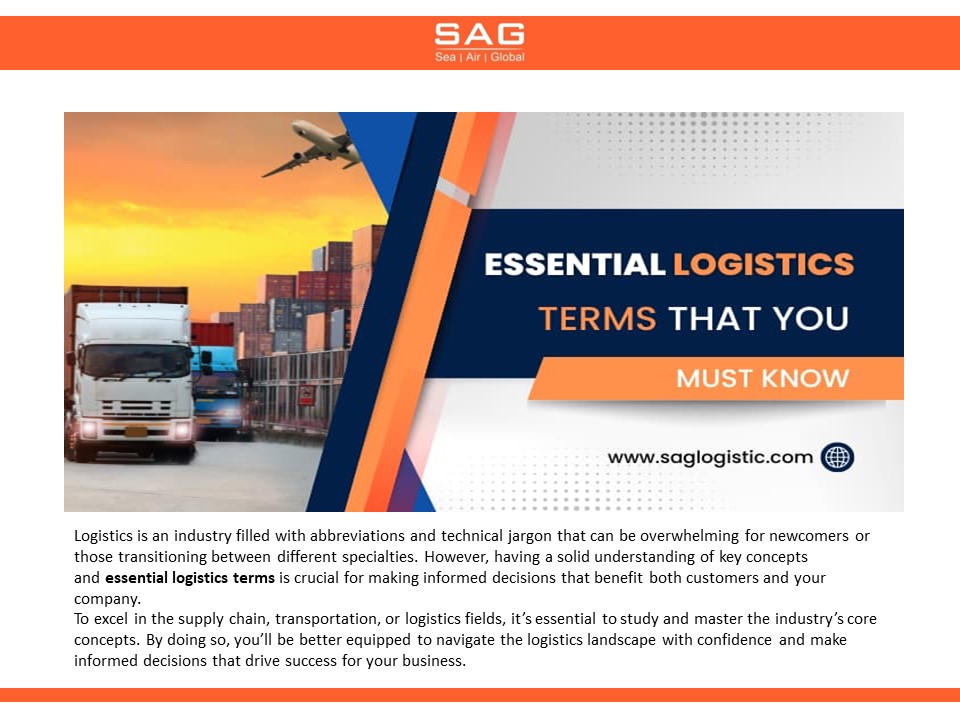Essential Logistics Terms That You Must Know - PowerPoint PPT Presentation
Title:
Essential Logistics Terms That You Must Know
Description:
Learn the essential logistics terms that you must know ! Our guide will guide you the essential terms used in the shipping and supply chain industry. – PowerPoint PPT presentation
Number of Views:10
Title: Essential Logistics Terms That You Must Know
1
Logistics is an industry filled with
abbreviations and technical jargon that can be
overwhelming for newcomers or those transitioning
between different specialties. However, having a
solid understanding of key concepts and essential
logistics terms is crucial for making informed
decisions that benefit both customers and your
company. To excel in the supply chain,
transportation, or logistics fields, its
essential to study and master the industrys core
concepts. By doing so, youll be better equipped
to navigate the logistics landscape with
confidence and make informed decisions that drive
success for your business.
2
Here Know Essential Logistics Terms
1. Supply Chain
- A supply chain involves the various steps that a
company undertakes to produce and distribute a
particular product or service, which typically
involves several parties, including producers,
suppliers, warehouses, transportation companies,
distribution centers, and retailers. - The supply chain process typically starts with
the production of the product, which is then
handed over to a logistics provider acting as a
wholesaler.
3
2. BOL
- The abbreviation BOL is also one of
the logistics terms refers to the Bill of Lading,
which is a critical document issued to shippers
when transporting goods. - This document contains essential details about
the contents of the shipment, its destination,
and other relevant information. - Essentially, it serves as a receipt for the
delivery of goods to another port and can also
act as proof of ownership for pickup or delivery
purposes.
4
3. FCL and LCL
- FCL and LCL are two commonly used terms in the
logistics industry, which refer to Full Container
Load and Less than Container Load, respectively. - In a Full Container Load, the entire container
is loaded with goods that are owned by a single
shipper. - On the other hand, in a Less than Container
Load, the shipper does not require the entire
container and shares the space with other
shippers.
5
4. Crowdfunding
- Crowdfunding is a relatively new method of
raising funds for projects by soliciting
donations from a large number of people,
typically within a short period of time. - This method is primarily carried out online,
usually via social networking platforms such as
Kickstarter and GoFundMe. - Crowdfunding has been used by individuals,
organizations, and businesses to finance various
projects, including the development of blockchain
technologies and even the production of movies.
6
5. TEU and FEU
- When it comes to shipping containers, TEU and
FEU are two acronyms used to describe their
sizes. - TEU stands for Twenty Foot Equivalent Unit,
while FEU stands for Forty Foot Equivalent Unit. - While various boats and ports may need various
cargo containers, TEU is the common base stature
used to determine the capacity of cargo ships.
7
6. 3PL
- 3pl logistics, refers to the practice of
outsourcing logistics services to a third party. - These services may contain warehousing,
distribution, transportation, and fulfilment. - By relying on a third party for these services,
businesses can focus on their major competencies
and leave the logistics to the experts.
8
7. CIF
- The acronym CIF stands for Cost, Insurance, and
Freight, which refers to a trade term in which
the seller provides the cost of transportation
and shipping insurance for the buyer. - It is important to note that this does not cover
all costs, as the buyer is still responsible for
import duties and local delivery charges. - CIF is commonly used in international trade,
particularly for those who import goods from
countries.
9
8. COGS
- The term COGS stands for Cost of Goods Sold,
which refers to the direct costs involved in
manufacturing a product. - These costs typically include raw materials,
packaging, and direct labor costs associated with
producing or selling the goods, excluding other
expenses such as marketing.
10
9. VAT
- VAT stands for Value-Added Tax, and it is an
important tax for logistics providers to
consider. - It is essentially a tax on the consumption of
goods and services. - The seller or producer pays the tax, but it is
ultimately passed on to consumers through higher
prices. - Over 160 countries use a VAT system, with many
in the EU. - Instead, it relies on a sales tax, which varies
by district or state.
11
10. OSD
- An OSD Report is a document completed by the
recipient to determine whether the received goods
are damaged, overaged, or short. - Overage refers to the receipt of more products
than what was expected, while shortage means
receiving less than the required amount. - Damaged goods are those that have scratches,
cuts, or other types of damage that render them
unusable.
12
Get In Touch
Address- 1202, Level 12, Fahidi Heights - AWR
Properties, Dubai, United Arab Emirates Contact
No- 971 43494262,971 54 792 8524,91 98580
20562,971 55 665 8178 Email -
info_at_saglogistic.com Website- www.saglogistic.com
Read Blog - Essential Logistics Terms That You
Must Know































